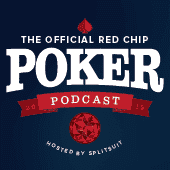A lot of players wonder what it takes to play poker as a full-time professional. James “SplitSuit” Sweeney dedicates an entire episode to answering the question, “Should I go pro?”
To start, SplitSuit offers a frank admission: For most players, the answer is no. There are myriad reasons why the decision to become a professional poker player is fraught with uncertainty and great obstacles to overcome. It’s not meant for everybody. That doesn’t mean you shouldn’t try, but it does mean you need to be aware of the perils and pitfalls before you venture forth, and take very slow, steady steps toward the pro lifestyle and career.
In practice, going pro is one of the more difficult challenges you can give yourself. But here’s what you need to keep in mind before you give your boss the finger and play poker for life.

The Financial Math
The first thing you should do is the math.
Your survival number is the lowest amount of possible income you can make to survive month after month. Your survival number your rent, food, utilities, taxes, and the many other fixed and variable costs in your life. These thousands of dollars per month are the ones you need to keep a life you’re happy with.
Project Your Winnings
Next, project your winnings as a full-time poker pro. Be very mindful here. Most people decide to go pro after a period of winning and success. So you need to be brutally honest with yourself and ask, “Is this success sustainable, or just the result of great variance?”
SplitSuit himself made this mistake early on in his poker career, doing back-of-the-napkin math on how much he could win while studying in college. He saw a nice, healthy income projection and decided he wanted to pull the trigger.
But keep in mind, the smaller the sample size of wins, the less reliable your projections will be. Your win rate today is not a perfect predictor of future win rates in addition. The game is constantly changing, not to mention the huge difference in playing part-time vs. full-time. Your win rate will invariably change because one of the typical goals of a poker career is to have flexible hours and down time, so your win rate is likely to be less. Furthermore, the stress of having to play A game for 40-45 hours per week, for example, can impact your win rate greatly.
Don’t be too optimistic when projecting your winnings.

Discipline and Win Rate Fluctuation
Do you have enough discipline to set or keep a grind schedule?
When you have a real job, you have a boss that is giving you your to-do list, giving you your hours. When you are your own boss, you have to have the discipline to keep your grind schedule and also managing your mental game well.
If moving to a new location or a new game is part of your career strategy, your win rate may change significantly. SplitSuit suggests dipping your toe into the location first to get a feel for what your win rate might be.
He also has a formula to share: Take your current hourly win rate, divide by two. Then take the amount of hours you think you’re going to play when you go pro, and divide that by two. Can you still hit your survival number in this worst-case scenario? If the answer is yes, you’re not out of the woods yet. There are more obstacles to overcome. But if you have a large enough sample size of disciplined full-time play in the location of your choice and the numbers look good, you are well on your way.
The Rough Stuff
The Rake – SplitSuit’s not talking about the rake on the table, he’s talking about the IRS. Taxes will have to be paid as a professional poker player, and they will not come cheap. When you run your own small poker business, you can say goodbye to refund checks you might have been sent from your full-time day job. In the U.S., you will get very used to writing huge checks to your state and federal governments. Rules vary from state to state, and obviously, country to country. Talk to an accountant or tax professional in your state to know how it will work for you before the full-time trigger.
Most of the time, you can ballpark your taxes at 25%.
Curious about how poker players pay taxes?
Listen to our podcast episode explaining taxes for poker players.
There are other expenses to consider. Traveling, especially for tournament players, can be a massive expense. This is something you will want to consider in the context of taxes as well, because tax law has very specific rules for travel expenses. Lodging, transportation, eating and entertainment all add up.
Hours & A+ Game
A lot of players start out thinking they’ll grind 45 hours per week. Many let their hours dwindle to 40, then 37, then 35, and sometimes back on down to near where they were playing before they went pro.
In a normal job, you get paid whether you put in an A+ day or a C- day. You can even have a D+ month and still keep your job. This does not work as a poker player.
You don’t get paid time off. You don’t get paid lunches. These are all your responsibilities.
It is extremely difficult to put in an A+ day when you run like hell. It is guaranteed that if you play poker long enough, you will hit a massive downswing at some point. You have to be aware of them and ready to persevere. If you don’t consider how a losing streak will affect your game, you’re not being honest with yourself. Severe downswings will happen to you, and they will challenge you.
Nest Egg
A nest egg is a separate chunk of cash you keep around in case of emergencies or unexpected costs. It’s your monthly survival number multiplied by however many months you think you need to feel comfortable. That number will vary by your station and position in life. The fewer responsibilities, the fewer months you will need. However, if you’ve got a wife and kid(s), you are going to want some more financial cushioning.
This chunk of cash is separate from your bankroll, so if your bankroll is ever massively depleted, you aren’t sweating being able to pay rent with your stack. If your bankroll runs out and you find yourself reaching into your nest egg, that may be a sign that going pro didn’t work out this time, and you might want to take a step back and assess where you’re at.
Opportunity Cost
What other options are currently available at the same time? This is the central question behind the economic concept of opportunity cost.
Ask yourself, “Why do I want to play poker professionally?”
Pursuing poker professionally is an opportunity that will always be available to you. You should seriously compare this opportunity to others in your life and be honest with comparing the pros and cons. After all, the poker room is always open.
Sometimes the number of options is staggering. It pays to work through the financial math behind a few of the ideas that interest you the month. Compare them to professional poker and get a true sense of the comparative value.
Professional poker can leave a gap in your resume, so make sure you keep that in mind.
SplitSuit says he would never give up a 9-to-5 to play poker professionally for roughly the same income. In the 9-to-5, you can usually perform poorly and still get paid, and you have your hours capped. The opposite is true for professional poker players. You can easily have a losing month, and sometimes you’ll have a stretch of several losing months. And this might require you to grind even more hours studying and improving A game.
In additional to the opportunity cost, consider the lifestyle and how it will affect the important relationships in your life. If you have a partner, make sure you communicate with them openly and transparently about the opportunity to go pro.
Need to explain your poker passion to your partner?
Listen to our podcast episode just for them.
Trial Before Trigger
SplitSuit’s final advice is to set aside 2-4 weeks to simulate going pro. You don’t want to change your entire life only to find on day 23 that your win rate isn’t what you thought it would be, or the poker pro lifestyle was not what you expected. Would’t you rather do a trial run than quit your job to find that out?

Great video again James. So weird it came now. I’m off to Vegas next Tuesday. I’ve been playing poker for about 7-8 years in local games generally. But there’s no casinos nearby to play consistently. Been to Vegas a bunch of times. But I decided to go to Vegas for 17 days just like your trial before trigger suggestion. I watched a ton of your videos over the past few years and after reading a couple of Ed millers books to supplement what I learned from your material my outlook on the game changed so much. Kinda like how it took my 5th teacher/professor to explain plato’s cave in such a way that it just finally clicked. I’ve always loved playing cards with family or friends,Poker, rummy etc. I’m in the “I hate my boss, working, etc” basket. Even though it’s only 17 days. I feel like this is almost my all in moment when it comes to poker due to other life circumstances. My only goal really is to win enough money to pay for expenses so I can go back to Vegas after Christmas and New Years. I just hope I don’t run terribly in these 17 days.
Thanks Remy. Best of luck in Vegas and just remember to enjoy yourself. Play hard, eat well, and enjoy the process =)
This was awesome and very informative. I have experimented with playing as a job before and found it to be a miserable experience. Despite years of enjoying it as a hobby, I got to the point where I didn’t even like the game anymore. Something about having to do something whether or not you feel like it makes any activity less enjoyable – at least in my experience. The original appeal was that it provided an opportunity to escape enslavement from a job. But I see now that it’s also possible to be a slave to poker. I’m glad you mentioned the fact that there are many opportunities available besides poker. It’s definitely important to keep things in perspective and understand what it really means to be a poker pro. Thank you for this!
Thanks for sharing that Vanessa – I think it’s something a lot of people need to digest!